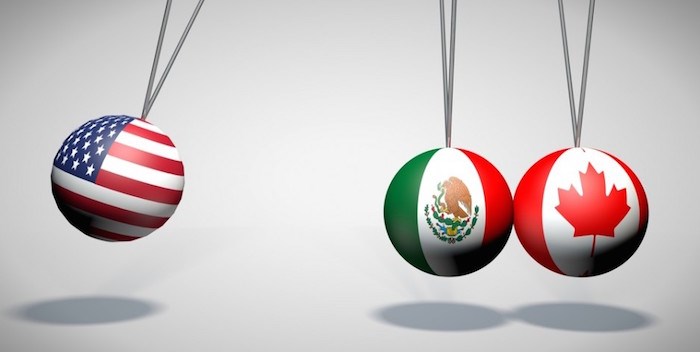After a rocky start Friday morning, NAFTA talks have broken for weekend and are expected to resume next week, according to media reports.
 Shutterstock
Shutterstock
NAFTA negotiations have been shrouded in a week of uncertainty after U.S. president Donald Trump's announced his self-imposed deadline of Friday (August 31).
However, hopes of a deal were dampened early Friday morning after off-the-record comments by Trump were leaked. The U.S. president reportedly told journalists that he was not going to make any compromises with Canada when it came to NAFTA.
Reports of Trump’s unwillingness to compromise match comments from the Canadian government earlier this week that the U.S. was not offering movement on issues brought up by Canada.
In response, Foreign Minister Chrystia Freeland told the media that Canada will defend its interests and won't cave on the deal.
Despite the Friday morning tiff between sides, by roughly 11 a.m. Pacific time, Canada’s chief NAFTA negotiator Steve Verheul told reporters that they were having a good day.
A Canada-less NAFTA 2.0 would not be of significant benefit to B.C.’s economy, but the province would be less affected than others. Roughly 16% of the province's gross domestic product is based on exports to the U.S., significantly less than Alberta and Saskatchewan at 27% each. Ontario, which has the highest dependency on U.S. trade at 50%, would likely be most affected.
Conversely, Michigan has the highest dependency on Canadian trade out of any U.S. state; Canadian exports make up only 15% of the state’s GDP.
“B.C. is less impacted by the future of NAFTA and/or proposed tariffs than other provinces,” said Bryan Yu, deputy chief economist at Central 1 Credit Union, in a note to investors. He added, however, that some regions of the province, such as Kitimat, which is home to an aluminum smelter, would suffer more harm than others.
B.C. has been partly insulated from the U.S. trade dispute because the original agreement does not cover the softwood lumber sector. Recent trade agreements with other regions and its position as a gateway to the Asia Pacific further protect it from potential trade issues.
While B.C. may be well protected, a Canada-less NAFTA is not necessarily possible. Based on U.S. trade law, authority for negotiating international trade deals lies with the U.S. Senate and House of Representatives, not the president. As a result, the president has to seek permission from the U.S. Congress to negotiate. When Trump sought permission for the renegotiation of NAFTA, he was permitted to negotiate a trilateral agreement that includes Canada. This raises questions about whether a bilateral deal with Mexico can even be approved, Caro Dade, director of the Centre for Trade & Investment Policy with the Canada West Foundation, told BIV Today, the Business in Vancouver podcast.



